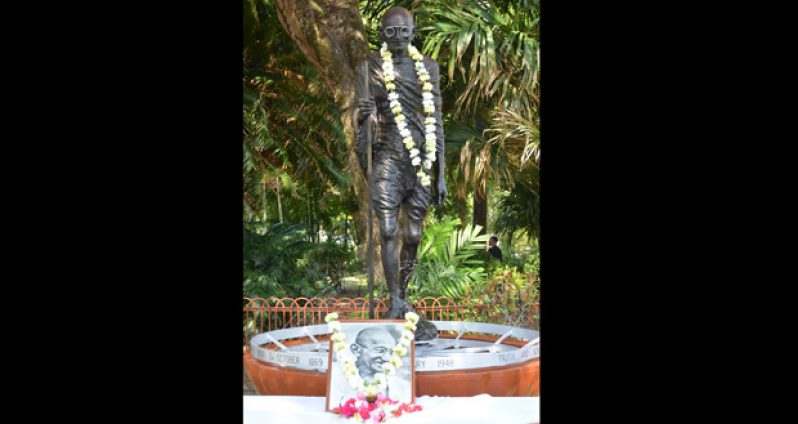by Petamber Persaud
‘The Story of my Experiments with Truth’
WHAT else can be said, what else is there to be written about Gandhi. Almost a century and a half after his birth, the life and work of Mohandas Karamchand Gandhi continue to be analyzed by the academic and layman, the skeptic and the believer, looking at every facet of his life, his challenges and experiments with fanaticism, religious bigotry, intolerance, superstition, patriotism, injustice and oppression, among other issues.Almost a century and a half after his birth, the life and work of the Mahatma continue to be celebrated worldwide. Almost a century and a half after his birth, the life and work of the great soul continue to inspire people worldwide. Among the admirers of his work are Dr. King, President Obama, Lech Walesa, Mandela, Sung San Suu Kyi and Einstein. Over seventy countries have erected statues in his honour…
At a recent commemoration in Guyana of Gandhi’s 146th birth anniversary, staged by the High Commission of India on October 2, 2015, many of the tributes underlined the fact that Gandhi belongs to the world. Gandhi belongs to the world and Gandhi belongs to Guyana. Gandhi belongs to Guyana in many ways. He belongs to Guyana through the 239, 000 indentured Indian labourers who were brought to Guyana from India between 1838 and 1917. He belongs to Guyana through those people and their descendants. He belongs to Guyana through his friend C. F. Andrews, who was a friend of Guyana. He belongs to Guyana inspiring men like Dr. W. H. Wharton (first Indian doctor), Thomas Flood, Francis Kawall, Peter and Joseph Ruhomon, among others, inspiring the establishment of movements like the East Indian Institute, the British Guiana East Indian Association, the Indian National Congress and publications like ‘Indian Opinion’. And most of all, he belongs to Guyana because it was his effort that brought an end to the indenturship scheme.
What else can be written on Gandhi. His reading material was examined, including all the books that had an influence on him. And he read avidly and the list of books was long and impressive. Almost all of his writings has and continue to be analyzed with critical appreciation. Almost all of his correspondences were published, some warranting scholarship. Among his approaches to life was his modus operandi – writing letters, different types of letters to suit the occasion. Here, I would like to look at one of his letters found in his book, ‘The Story of my Experiments with Truth’, (the Mahadev Desai translation). This book, covering the period from his birth in 1869 to 1921, is fascinating, totally absorbing and is an experiment (in reading and writing). I have read many autobiographies and reread a few, but Gandhi’s would not let me go because it is so innocent, so sincerely written in a most engaging manner. I like the way it was written – short chapters pregnant with meaning.
Early in the book, on page 23/24, I was touched by a letter he wrote to his father. I was touched and perplexed by this gesture, dwelling on the whole episode because it showed since then, early in his life, he was experimenting with the truth, falsehood, apology (saying sorry) and repentance. It bothered him committing two acts of stealing, not the thought of been found out, resolving not to steal again. But there ‘could not be a cleansing without a clean confession’. So he deliberated and wrote a letter of confession and apology to his father. In the letter, he asked for ‘adequate punishment’ and requested his father not to punish himself for the son’s offence. He watched his father reading the letter and ‘pearl-drops trickled down his cheeks’, a father in agony, those pearl-drops of love cleansed the son’s heart. ‘This sort of sublime forgiveness was not natural to my father…he was so wonderfully peaceful…I know that my confession made my father feel absolutely safe about me, and increased his affection for me beyond measure’. It is amazing what was achieved through this confession/apology letter.
Gandhi was a letter writer par excellence. And this inspired Bechu of Enmore Estate in Guyana to write letters to the press in a similar vein, trying to right wrongs, giving voice to the disenfranchised human suffering under inhumane conditions on the sugar plantation.
He loved to write and he was a master of the craft of penmanship, knowing that ‘good handwriting is a necessary part of education’.
It was as if he adopted the words of the English Essayist, Francis Bacon, who wrote this on the subject studies, ‘Reading Maketh a Full Man; Conference a Ready Man; Writing an Exact Man’.
Mohandas K. Gandhi was born on October 2, 1869, in Porbandar, Gujarat, India. He was shy at school, shying away from sports and games but managed to win prizes and scholarships. His formative days and adulthood were fraught with challenges, all of which he overcame mostly by experimenting with each subject/issue. He experimented with frugality and economy, social norms, Eastern thoughts and Western philosophy, discrimination, nutrition, cooking, hygiene, caring for the sick/elderly, language, religion, and the environment, all of which helped him in his season of discovery, eking out the truth for himself and plotting the way forward.
Books played a major role in his life – ‘[m]y books and my lessons were my sole companions’. His autobiography and other writings have influenced ‘The Shaping of Indo-Guyanese Imagination’ (Clem Seecharan) aiding in the shaping of Guyanese literature.
Responses to this author telephone (592) 226-0065 or email: oraltradition2002@yahoo.com
What’s happening:
The 2016 Commonwealth Short Story Prize is now open for entry; please go to the website for more information.



.jpg)








